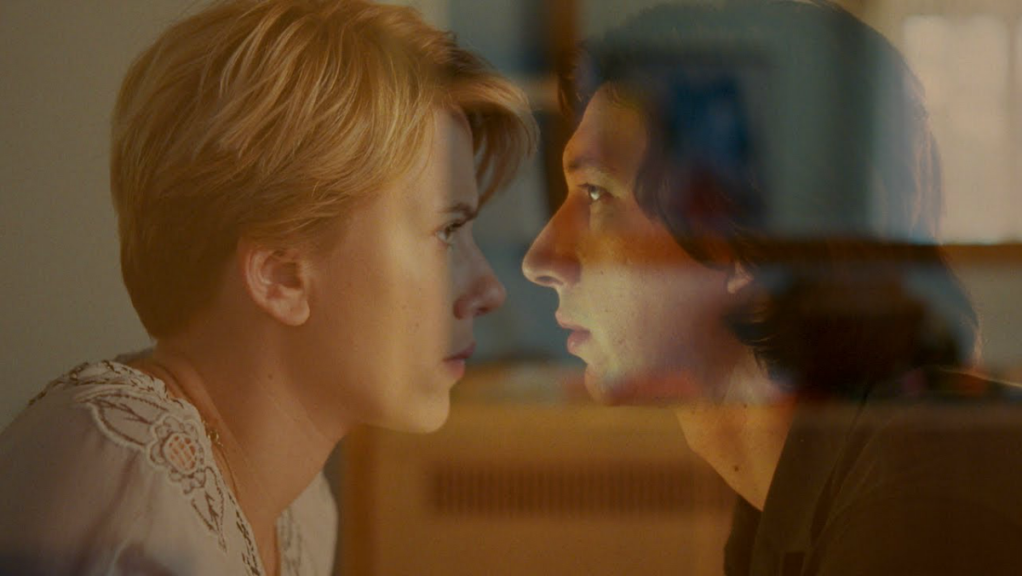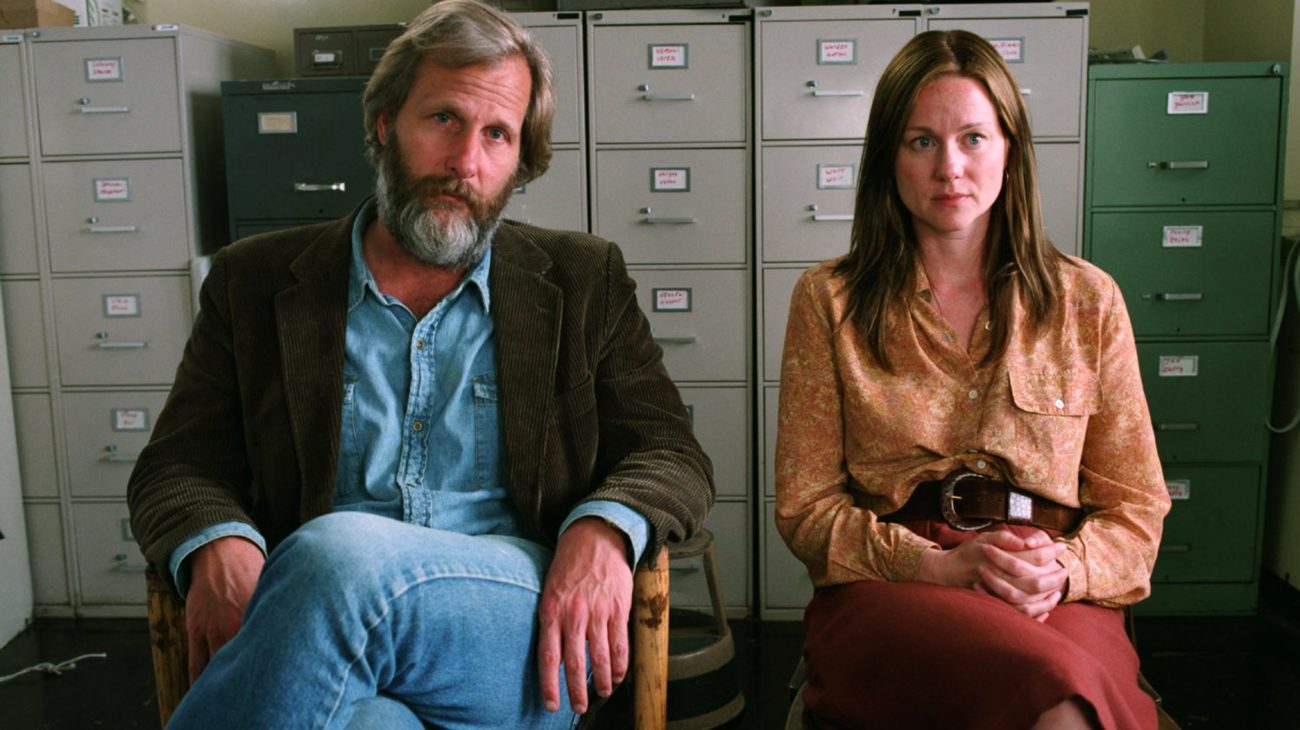By Curtis Woloschuk

From the moment details of Marriage Story emerged, it became customary for commentators to suggest that Noah Baumbach’s latest effort was a spiritual successor to his 2005 breakthrough feature, The Squid & the Whale.
There are undoubtedly parallels to be drawn. Squid centres on two brothers, 16-year-old Walt (Jesse Eisenberg) and 12-year-old Frank (Owen Kline), clumsily cut adrift in the tumult resulting from the impending divorce of their parents: Bernard (Jeff Daniels), a novelist prone to self-aggrandizement, and Joan (Laura Linney), who is rocketing up New York’s literary ranks. Just as the brothers bemoan being shuttled across Brooklyn’s Prospect Park in order to comply with custody arrangements, Story’s Charlie (Adam Driver) is exasperated with having to crisscross continental states in order to keep his theatre company thriving in New York City while trying (and failing) to negotiate an amicable divorce with Nicole (Scarlett Johansson), an actress who’s shooting a pilot in Los Angeles. But whereas Bernard and Joan are all too eager to weaponize their impressionable progeny against one another, Charlie and Nicole strive to mitigate the emotional impact on their young son, eight-year-old Henry (Azhy Robertson).
Baumbach’s characters have routinely found solace in the narratives they construct, wrapping themselves in fictions as if they were quilted blankets. “Tell me the story of us,” Frances Ha (Greta Gerwig) implored best friend Sophie (Mickey Sumner) in the 2012 film of the same name. From her wistful tone, it was apparent that she was desperate to have the bitter pill of reality doused with a liberal dose of sugared fantasy. As Marriage Story opens, Charlie and Nicole have been cajoled by a mediator (Robert Smigel) into praising one another’s virtues, ushering in complementary montages that serve as overtures of endearing tendencies and noble traits intended to send us tumbling headlong into infatuation with the pair. Granted, the rug soon is pulled out when Nicole abandons the exercise in favour of getting down to the business of dissolving their union. (We learn much about Charlie when he still lobbies to read his piece, which he’s exceedingly pleased with.) When Nicole hires her lawyer, Nora (Laura Dern) requests, “Tell me your story.” Elsewhere in Baumbach’s filmography, this would serve as an open invitation for self-congratulation. Here, it culminates with Nicole’s devastating evaluation that, despite her professional and personal triumphs, her marriage has left her with a distinct sensation: “I got smaller.”
With this declaration, it becomes apparent that, while this story won’t mark a departure for Baumbach, it will travel a different trajectory than his previous work. Just as The Squid and the Whale certified Baumbach’s sublime way with words, it also served notice that the pursuit of adoration and authenticity would function as sources of motivation and oppression in his cinema. Perhaps this is understandable given the state of Baumbach’s career in 2005. A decade earlier, his debut feature, Kicking and Screaming, premiered at Sundance to strong reviews. Having put himself on the map, he almost immediately set about drifting off course with the hit-and-miss comedies Mr. Jealousy and Highball, an ultra low budget DIY experiment that was ultimately released directly to DVD with Baumbach’s writing and directing credits removed, as per his request. It would have been understandable if the writer-director feared he was only a decade of disappointments away from bearing an unnerving resemblance to Bernard.

Squid suggests that the anxieties of the father are prone to poison the bloodline. Walt parrots Bernard’s pompous assertions about Orson Welles films he’s never seen and “minor” novels he’s never read. His desperation to contribute something of consequence to the discourse culminates with him passing off Pink Floyd’s “Hey You” as an original composition at his high school talent show. When he’s inevitably found out, he rationalizes, “I felt I could’ve written it, so the fact it was already written was kind of a technicality.” And with his his shoddily erected house of cards collapsing, he anguishes, “I don’t see myself as a person who’s in this situation… I just don’t see myself this way.”
Time and again, Baumbach’s characters have actively deceived themselves into believing that their sorry circumstances were somehow in service of their ultimate objectives. In Marriage Story, however, Charlie and Nicole allow their respective records to speak for themselves. For his part, Charlie is an innovative titan of the New York theatre scene who, during the course of the film, has his “genius” credentials certified by receiving a MacArthur Fellowship Grant. Meanwhile, Nicole has successfully transitioned from starring in Hollywood teen comedies to being a highly regarded stage actress.
Having accrued all of the credibility – and yet, due to Charlie’s stature, not nearly as much credit – she could hope for, Nicole is eager for a new challenge to claim as her own. The fact that this adventure comes in the form of an episodic sci-fi series with a distinct ring of ridiculousness invites both the discerning viewer and Charlie to express their derision. And, this being a Baumbach film, Charlie’s condemnation takes a particularly condescending tone. When Nicole looks to him for assurances that the pilot is something worthy, he shrugs dismissively, “I don’t really watch TV, so I wouldn’t know.” All of this while staring at his flat screen television. Just as Bernard knew precisely how to mercilessly exploit Joan’s vulnerabilities on the tennis court in Squid’s opening scenes, this telling sequence reminds us that intimate familiarity shared by spouses leaves them keenly aware of where another’s defences are the weakest.
In any exploration of the emotional morass that is a relationship’s dissolution, part of the intrigue hinges on how the documenter might balance accountability. In this regard, Baumbach assumes a decidedly different tack with Marriage Story than Squid. Bernard was such an oppressive bore that his culpability was never in question. With that accounted for, Baumbach set about incrementally revealing how Joan’s candour around her sexual exploits exacted a toll on her sons, both of whom are being treated like piñatas by their raging hormones.
With Marriage Story, Baumbach offers frequent invitations to sympathize with Charlie. Not only has his son been whisked 4,500 km away, but Nicole is the one who has opted to lawyer up. The first time Charlie and Nora meet, there’s very much the sense that a gangly puppy may’ve haplessly wandered into a dog fighting ring and is now staring down a battle-tested pitbull. Likewise, one might be inclined to feel a twinge of pity when Charlie realizes that he’s no longer welcome to stay at Nicole’s family home in Los Angeles and is forced out onto the street. As the narrative progresses, we come to recognize that what initially may’ve been attributed to innocuous obliviousness is, in fact, the sort of paradoxical cocktail of disengagement and expectation that arises from having enjoyed a prolonged run of privilege and entitlement.
Much has already been made of the devastating fight scene in which Charlie and Nicole, without lawyer’s present to serve as their proxies, lay into one another with vicious cutting that reduces a one bedroom apartment to the emotional equivalent of The Wild Bunch’s The Battle of Bloody Porch. Tellingly, the regrets expressed by Charlie bear a striking resemblance to those of Bernard. Just as the latter still wallows about the indiscretions that might’ve been at a George Plimpton-hosted party years earlier, Charlie can’t keep from pitying himself for the sexual sacrifices he made to be a husband and father. As Charlie flails verbally, he catches Nicole with a couple of accusatory haymakers but never once genuinely connects with her. In the most grimly tragicomic moment in the bilious barrage, she confesses that, regardless of the legal proceedings’ outcome, she’s already lost because, “You didn’t love me as much as I loved you.” His response? “What does that have to do with LA?” In this moment, his self-involvement becomes so toxic that you practically expect chemical burns to appear on the film stock.
A few scenes later, Charlie accidentally opens a gaping wound in his arm while carelessly wielding a box cutter. However, it’s plainly apparent that his most grievous self-inflicted wounds have been administered over the course of years spent flourishing amidst a marital imbalance.
As Squid wound its way to a close, Bernard remained imperious, opining tediously and still striving to play passive aggressive puppet master from the confines of a hospital bed. Finally recognizing his father for what he was, Walt took the opportunity to flee the scene, sprint through the streets of New York, and finally confront his greatest childhood fear: the Museum of Natural History’s towering diorama of squid fending off a whale intent on devouring it. And while Walt took the first tentative steps toward adulthood, we assumed that Bernard would have gained nothing from the trial other than amassing more fuel for the delusional fire that powered him.
Baumbach has undoubtedly become a more generous filmmaker in the ensuing years. Marriage Story closes with Charlie at least suggesting that he’s ready to atone for his transgressions. In the film’s closing shot, we’re freed of the claustrophobic interiors that have served as the backdrop for 130 minutes of fraught, close-up drama and finally offered a glimpse of “the space” of Los Angeles that countless characters have praised the virtues of. And with such space, there’s also a sense of possibility. In that moment, it seems conceivable that Charlie might just make good on an earlier suggestion that he could “be a better husband [and father] in divorce.” And, in doing so, there’s the glimmer of hope that he might just earn redemption sometime after the end credits have rolled.
Marriage Story plays the Vancity Theatre throughout the month of December. Showtimes can be found here.

1 comment